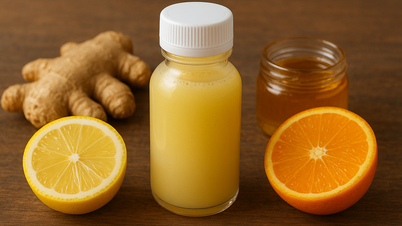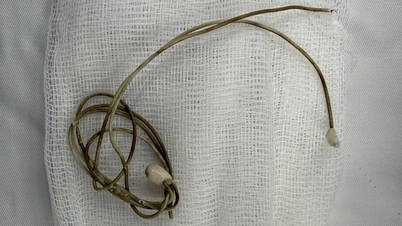The question is, is there any scientific basis for ginger's use in treating nausea and other stomach problems? In fact, ginger supplements rank as one of the best-selling dietary supplements in the United States.
Only a handful of relatively small studies have answered those questions, says Dr. Michael Curley, a gastroenterologist at Dartmouth Hitchcock Medical Center in Lebanon, New Hampshire. And most of those studies have focused specifically on nausea and vomiting.

Some small studies show that ginger can relieve symptoms of nausea and vomiting (Photo illustration: Hopkinsmedicine).
How can ginger help?
Ginger contains two pungent compounds - gingerol and shogaol - which are thought to reduce nausea by blocking nausea-related pathways in the gut and brain, thereby preventing the brain's vomiting center from being activated, said Dr. Megan Crichton, of Queensland University of Technology in Australia.
Some limited evidence also suggests that ginger supplements may reduce symptoms by speeding up stomach emptying, adds Dr. Keshab Paudel, a pharmacist and physician specializing in ginger research in the US.
Most studies on ginger and nausea have used supplements containing dried ginger root powder, which has been shown to help reduce nausea in people who are pregnant, undergoing chemotherapy, or have just had surgery, says Dr. Crichton.
For example, in a 2025 review of studies, Dr. Paudel and his colleagues found that pregnant women who consumed 500 to 1,500 mg of ginger supplements daily had improved nausea symptoms, but they did not vomit less.
According to TODAY.com , in a 2024 clinical trial of about 100 people undergoing chemotherapy, Dr. Crichton and colleagues found that when participants consumed 1,200 mg of ginger powder daily with food (from the day they started chemotherapy and for four days afterward), they felt less nauseous than patients who took a placebo.
There is little research on how ginger can help relieve more acute nausea, such as nausea caused by an upset stomach, a hangover, or motion sickness. There is also little information on how ginger works for other stomach conditions, such as indigestion or irritable bowel syndrome.
However, a small 2023 study concluded that it may help reduce symptoms of functional dyspepsia, a chronic type of indigestion. Participants reported improvements in heartburn, pain, and burning in the upper abdomen.
Which one is effective?
Ginger comes in many forms. You can eat it raw or as a spice, drink it in tea or soda, suck it as a lozenge, and swallow it in capsule form. However, there is little data on how different forms compare when it comes to soothing the stomach.
Dr. Joshua Forman, a gastroenterologist at the University of Maryland St. Joseph Medical Center, often recommends that patients with nausea try ginger supplements.
They provide a more consistent dose than raw ginger or ginger-containing foods and drinks, and are better tolerated by people who don't like the taste of ginger, he says.
He recommends taking 500mg twice daily to treat nausea caused by chronic problems, like morning sickness, or by short-term ailments like stomach upset, hangovers, and motion sickness, although there is little research on ginger's effectiveness in those cases.
It's possible that other ginger-containing products, such as ginger-flavored beer, tea, and candy, may also help with nausea, but there's little research on them, Dr. Crichton adds. And they're often less concentrated than supplements, so you may have to consume more to get the same effect.
Ginger in any form is generally considered safe, however Dr. Crichton advises people taking medications including blood thinners, immunosuppressants, and drugs for blood pressure or diabetes to consult their doctor before using ginger regularly.
Although serious side effects are rare, people may experience increased gas after consuming ginger.
Source: https://dantri.com.vn/suc-khoe/gung-co-thuc-su-lam-diu-con-dau-da-day-20251009070910470.htm












































































































Comment (0)